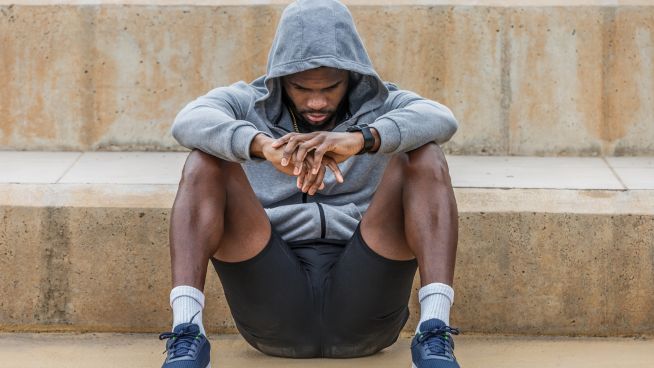5 Science-Backed Ways to Get More Out of Shorter Workouts
![]()
Working out regularly is challenging. Between work, friends and family—and binge watchingHouse of Cards on Netflix—it can be hard to carve out the time necessary to put in work at the gym.
Instead of trying to find more time for more workouts, focus on getting the most out of the time and effort you are already spending at the gym.
Here is how to train smarter:
1. Do the important exercise first

Chances are, you are focused on one primary muscle group or exercise when you get to the gym. After you’ve got yourself loose and mobilized, work that muscle group and perform that exercise.
Doing the important exercise first, when you are mentally and physically fresh, gives you an opportunity to hit it hardest.
Research backs up what you probably already know: over the course of a workout, performance drops off with each subsequent exercise. So hit the important stuff early.
2. Journal your diet and workouts

What does keeping a workout log have to do with training smarter? Well, it helps to keep you accountable, consistent and even motivated.
Research done at Johns Hopkins and Duke found that participants who kept a daily record of what they ate lost twice as much weight as a control group.
Spending a couple of minutes at the end of your session (or day) to take inventory of your training and nutrition will help you spot trends and bad habits, and, most importantly, keep you moving forward.
3. Visualize the process
Thinking about goals in the gym is easy and kind of fun. You get to imagine the awesome things you will accomplish, and how good you will look and feel!
However, if you want to make your workout habits bear fruit, you are better off visualizing what it takes to get there.
When two groups of students preparing for an upcoming midterm at UCLA were asked to either visualize themselves doing well on the test or visualize the process of what it would take to do well, the latter group performed significantly better. The process-visualizers also experienced less stress and anxiety, and exhibited better study habits.
Spend a few minutes a day mentally rehearsing how you plan to crush your workout.
4. Use caffeine for pep and focus
Want to lift more weight for more repetitions? Drink a hit of caffeine before your workout. There’s a reason why pre-workout powders are so popular, and why Americans drink just over 3 cups of coffee per day on average.
Compared to the control group, participants in a study belted out more Bench Press reps at a higher weight after ingesting just 5 mg of caffeine.
5. Catch your “Z’s”

Want a guilt-free reason to spend more time between the sheets? (Uh, who doesn’t?) The easiest way to train smarter in the gym can actually be found in your bedroom.
Research done at Stanford with members of the basketball and swim teams found that athletic performance significantly increased when the players were tasked with sleeping more. Reaction times, sprint speed and shooting percentages all improved among the athletes who moved to sleeping 9-10 hours per night.
You don’t have to be an NCAA Division I athlete to reap the benefits of additional sleep. Sure, it might mean powering down Netflix a bit earlier than usual, but your rewards in the gym may be well worth it.
[cf]skyword_tracking_tag[/cf]RECOMMENDED FOR YOU
MOST POPULAR
5 Science-Backed Ways to Get More Out of Shorter Workouts
![]()
Working out regularly is challenging. Between work, friends and family—and binge watchingHouse of Cards on Netflix—it can be hard to carve out the time necessary to put in work at the gym.
Instead of trying to find more time for more workouts, focus on getting the most out of the time and effort you are already spending at the gym.
Here is how to train smarter:
1. Do the important exercise first

Chances are, you are focused on one primary muscle group or exercise when you get to the gym. After you’ve got yourself loose and mobilized, work that muscle group and perform that exercise.
Doing the important exercise first, when you are mentally and physically fresh, gives you an opportunity to hit it hardest.
Research backs up what you probably already know: over the course of a workout, performance drops off with each subsequent exercise. So hit the important stuff early.
2. Journal your diet and workouts

What does keeping a workout log have to do with training smarter? Well, it helps to keep you accountable, consistent and even motivated.
Research done at Johns Hopkins and Duke found that participants who kept a daily record of what they ate lost twice as much weight as a control group.
Spending a couple of minutes at the end of your session (or day) to take inventory of your training and nutrition will help you spot trends and bad habits, and, most importantly, keep you moving forward.
3. Visualize the process
Thinking about goals in the gym is easy and kind of fun. You get to imagine the awesome things you will accomplish, and how good you will look and feel!
However, if you want to make your workout habits bear fruit, you are better off visualizing what it takes to get there.
When two groups of students preparing for an upcoming midterm at UCLA were asked to either visualize themselves doing well on the test or visualize the process of what it would take to do well, the latter group performed significantly better. The process-visualizers also experienced less stress and anxiety, and exhibited better study habits.
Spend a few minutes a day mentally rehearsing how you plan to crush your workout.
4. Use caffeine for pep and focus
Want to lift more weight for more repetitions? Drink a hit of caffeine before your workout. There’s a reason why pre-workout powders are so popular, and why Americans drink just over 3 cups of coffee per day on average.
Compared to the control group, participants in a study belted out more Bench Press reps at a higher weight after ingesting just 5 mg of caffeine.
5. Catch your “Z’s”

Want a guilt-free reason to spend more time between the sheets? (Uh, who doesn’t?) The easiest way to train smarter in the gym can actually be found in your bedroom.
Research done at Stanford with members of the basketball and swim teams found that athletic performance significantly increased when the players were tasked with sleeping more. Reaction times, sprint speed and shooting percentages all improved among the athletes who moved to sleeping 9-10 hours per night.
You don’t have to be an NCAA Division I athlete to reap the benefits of additional sleep. Sure, it might mean powering down Netflix a bit earlier than usual, but your rewards in the gym may be well worth it.
[cf]skyword_tracking_tag[/cf]













